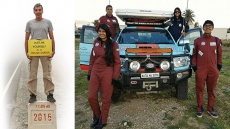In a world where millions of children suffer from the harsh realities of poverty, abuse, and neglect, Make a Difference (MAD) shines as a beacon of hope. Established in 2006 by the passionate and dedicated Jithin Nedumala, this remarkable NGO is making a profound impact on the lives of orphaned and vulnerable children in Bangalore, India, and beyond.
As countless children worldwide face uncertain futures, MAD's mission is to offer them a lifeline—to live with dignity, security, and the ability to cope with life's challenges. Join us on a journey to explore how MAD is making a real difference in the lives of these children, providing them with the foundation for a brighter future.

For Jithin Nedumala, who founded MAD in 2006 when he was just 20 years old, volunteering with children was a coincidence. After losing a close friend at the age of 19, he began volunteering at an orphanage in Kochi to "escape his own pain." There, focusing on someone else's struggles helped him find deeper happiness. "I was able to focus on something larger than myself for the first time," he adds. However, he soon realized that most children he was working with, owing to their circumstances, might get sucked into the world of crime and violence. "MAD was born because I was angry at society, where instead of providing children with the best care and support they need to break free of the cycle of poverty, we are just keeping them alive till 18 and then washing our hands of them," says Nedumala.
What They Do
Make a Difference (MAD) is on a mission to help orphaned and vulnerable children in India escape the intergenerational cycle of poverty. It is dedicated to providing long-term support and nurturing relationships to vulnerable children, allowing them to thrive in the real world. The organization's interventions cover academic support, life skills, emotional health, and transition readiness. These initiatives are tailored to different age groups, ensuring that children are equipped to navigate life's challenges successfully.

For the youngest age group, aged 10-13, MAD's Foundation Skills program lays the groundwork for their future, enabling them to cope and grow. As children progress into the 14-16 age range, the Education Support & Dream Camps offer individualized attention and high-quality support, bridging learning gaps and fostering the pursuit of higher education. Transition Readiness, designed for young adults aged 16-18, equips them to make a successful transition into broader society as they leave shelter homes. Furthermore, MAD's Aftercare Programme, tailored for individuals aged 18 and above, provides consistent support through a reliable mentor as they venture into college, vocational training, or employment, ensuring a reliable safety net during this critical phase of their lives.
The Impact
Today, the first generation of children that Nedumala taught are all adults. Most of them are married and earn a monthly income of Rs 20,000 to Rs 25,000 on average. MAD has also provided them with interest-free funding to build their first homes, creating a "cycle of support and happiness." For many MAD volunteers, the long-term relationships they have built with children bring them special joy and satisfaction. MAD has mobilized 4,250 young leaders to seek better outcomes for approximately 3,400 children annually in shelter homes across 23 cities.

How to Volunteer
MAD's success relies on its dedicated volunteers. The organization has worked with around 20,000 volunteers in the past 17 years. If you're interested in volunteering with MAD, you can join the ranks of the passionate individuals who have made a real difference in the lives of these children. Visit MAD's website for more information on how to get involved.

Jithin shares his inspiration and drive: "MAD gave me the opportunity to support and empower the most vulnerable children in India, and knowing it is possible keeps me going." He believes in the power of hard work and remains committed to ensuring every vulnerable child in India has a safe place to go.

